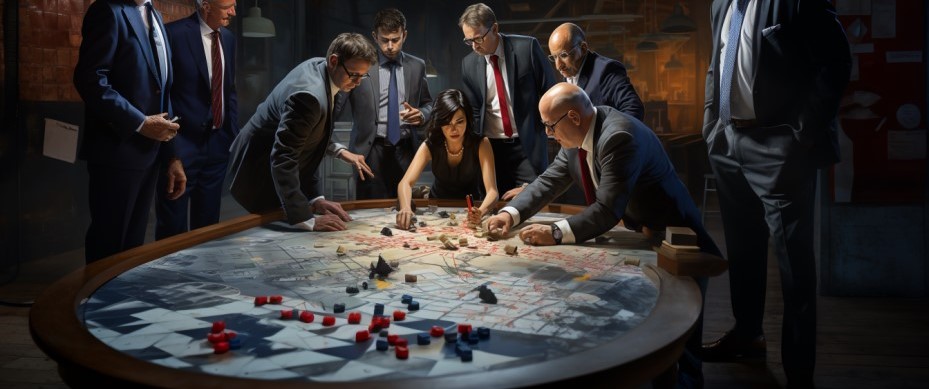Don’t Roll the Dice
The classic adage from the board game Risk is never to fight a ground war in Asia—adversaries will attack from all sides and your small plastic armies will fall quickly. Your companies may not be sending troops (real or plastic) into battle, but the spirit of this time-tested board game (and real life) rule still rings eerily true: Don’t get surrounded by your adversaries.
The bad news for most CEOs is that it’s too late. Every company and industry today is increasingly encircled by a line-up of challenges more diverse and fast-changing than public affairs professionals have ever encountered: A stakeholder economy where corporate decisions are inspected under the TikTok microscope and viral boycotts are just a hashtag away. A polarized political environment where the twin tides of populism and progressivism make every commercial decision political and where companies must adapt to both the red state and blue state versions of reality. Geopolitics where many are rethinking globalized trade and key power centers are contemplating divorce.
The good news for CEOs is you can still deploy the public affairs equivalent of Special Operations Command to save the operation. As our CEO recently argued in Forbes, to protect its interests and advance its objectives against pressures from all sides, your company should hire a Chief Political Risk Officer, or CPRO. Here’s what you need to know to make the case for a CPRO in your organization.
Subscribe to Receive Insights
"*" indicates required fields
Why you need a Chief Political Risk Officer
Don’t we already have people for political risk? Maybe, but too few companies have someone like this. As our CEO explained, the CPRO is “a senior executive position that owns political and reputational risk management and has a seat at the C-suite table.” That’s different than the people you may have for geopolitical advice (as many companies increasingly do), who zero-in on country-to-country relations, because the political uncertainty today is deeper than that. You may also have government relations staff. But as our CEO explained, too few companies “empower these professionals to ensure their business strategy is proactive, resilient and adept at managing the intricacies of today’s politically charged business environment.”
A CPRO is different because they have a seat in the C-Suite where they can “dissect and interpret the political landscape” and hold real sway in business decisions as they help their company “anticipate shifts, mitigate risks and capitalize on opportunities” before the damage is done.
Can’t my firm fly beneath the political storm clouds? Not anymore. As state and local politics and government grow more heated and complex, and as stakeholders increasingly scrutinize every business large or small, political risk is no longer “just the province of multinational corporations.” Nor is it a one-and-done deal. Camilla Cavendish, who was policy director for U.K. Prime Minister David Cameron, calls the state of affairs today one of “rolling crises” that means “government relations is no longer a backwater department,” particularly since, at every level, “governments are becoming more interventionist” across a broadening range of industry sectors.
Is political risk really that big of a deal? Absolutely. While political risk can be hard for companies to quantify on their balance sheet, studies provide a stark reminder that it’s a huge part of the bottom line. One study found up to 30% of earnings are at risk “from government and regulatory intervention.” Another determined effective government relations reduces the misallocation of company resources by 22%. If close to a third of your firm’s earnings are on the line, why wouldn’t you place a seasoned team member in a senior executive position to ensure your organization navigates political and reputational risks smartly?
Add these skills to your CPRO job listing
Gets ahead of policymaking before it’s too late. Government can have a profound impact on a company’s ability to operate. Today’s politics are increasingly swept up in the twin tides of populism and progressivism, neither of which has sympathy for business but both of which are shaping policy across a number of industry sectors and business interests. An effective CPRO has an acute awareness of how the political and policy landscape impacts operations, supply chains, and market opportunities and ensures your voice is heard in policy debates before it’s too late.
Steers the company clear of reputational hazards. With today’s heightened consumer activism, the CPRO’s role in decision-making is crucial, as brand equity—a valuable and hard-to-rebuild resource—can be easily damaged, with real and lasting financial costs. A good CPRO understands we are living in a post-Bud Light era in which anyone can be a Target, so having his or her counsel from the beginning can safeguard your company’s brand and reputation.
Leverages government policy objectives for the firm’s best interest. Government and industry are becoming more and more intertwined. From green infrastructure investments to rebuilding strategic manufacturing capacity to revitalizing downtown areas, a sharp CPRO can make crucial connections between policymakers’ objectives and your business interests, resulting in valuable incentives like tax abatements, loan guarantees, and other financial and reputational boosts.
Those who are ahead of the curve get to shape it
As the wise sage Vizzini warned, don’t fall “victim to one of the classic blunders! The most famous of which is, ‘never get involved in a land war in Asia,’” but a close contender of which is don’t navigate a complex political landscape without the acumen of a seasoned public affairs professional. Avoiding this blunder means your business can not only hold its position but gain ground even as you face pressure from all sides.
Positioning the CPRO at the forefront of decision-making, equipped with the necessary resources, is as necessary as having a CFO for financial stewardship or a COO for operational excellence. No business would operate without the latter two in place. In today’s operating environment, the same should be said for a Chief Political Risk Officer.



